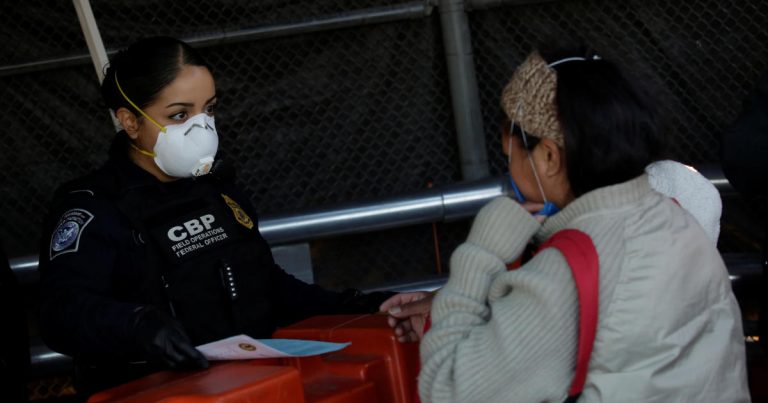
A federal judge ordered the Trump administration on Tuesday to stop enforcing an immigration rule that disqualifies most non-Mexican migrants from asylum at the U.S. southern border, saying the broad restriction was enacted unlawfully in the summer of 2019.
Judge Timothy Kelly of the U.S. District Court in Washington said he moved to strike down the regulation, a joint effort by the Departments of Justice and Homeland Security, because its implementation violated federal administrative law. Specifically, Kelly said the administration had offered an insufficient explanation for not allowing the public to see and comment on a draft of the policy before its enactment.
“The Departments rely on a single newspaper article that does not even directly address the key predictive judgment in question: the likelihood of a surge in asylum seekers so great and so rapid as to threaten human life or defeat the purpose of the Rule if notice-and-comment procedures were followed,” Kelly wrote in his opinion, referring to one of the administration’s justifications for bypassing the public comment period generally required for new federal regulations.
Kelly, who was named to the bench by President Trump in 2017, did not render a judgment on other claims filed by the plaintiffs, a group of asylum-seekers and organizations providing them legal services. In addition to violating the Administrative Procedure Act, the plaintiffs said the rule was contrary to a 2008 anti-trafficking law that established protections for unaccompanied migrant children, as well as the Immigration and Nationality Act, which allows people on U.S. soil to request asylum from persecution.
“The court recognized that the Trump administration unlawfully skipped steps mandated by Congress to ensure transparency in its failed attempt to make an end-run around asylum protections,” said Julie Veroff, an attorney with the American Civil Liberties Union, which, along with the National Immigrant Justice Center, filed one of the lawsuits Kelly consolidated into one case.
Tuesday’s order is a significant setback for the administration, which has used the regulation to deter U.S.-bound migrants, who officials and hard-liners have accused of exploiting the country’s asylum system to gain easy entry into the U.S.
Enacted as final rule in July 2019, the regulation struck down on Tuesday deemed migrants who did not seek some form of humanitarian protection in a third country on their journey to the southern border ineligible for U.S. asylum. Because it includes limited exceptions to this disqualification and affects even unaccompanied minors, the regulation shut off the asylum system for most Central American and non-Mexican migrants who travel through at least one third country to reach the U.S. border.
The rule was held up in court soon after its enactment until the Supreme Court intervened in September 2019 and set aside a nationwide injunction that stemmed from a separate lawsuit against the policy in California.
Administration officials have said the regulation is designed to curtail abuse of the asylum system and encourage other countries in Latin America to offer refuge to U.S.-bound migrants. But advocates believe the rule left many asylum-seekers with no place to seek safe harbor, since countries that migrants trek through to reach U.S. soil have anemic asylum systems and are plagued by violence and rampant poverty.
The rule’s implementation coincided with a sharp drop in the percentage of migrants who passed their initial interviews with asylum officers. Because most have been ineligible for asylum under the regulation, migrants have only been able to request lesser forms of relief from deportation. To establish eligibility for these programs, including protection under a United Nations anti-torture convention, migrants have to pass interviews that require a higher burden of proof than the ones for asylum.
While Tuesday’s order overturns, for the time being, one of the Trump administration’s main attempts to restrict asylum, its immediate impact on newly arrived migrants may be limited because of current policy at the southern border.
Citing the coronavirus pandemic, officials at both land borders have been rapidly expelling unauthorized migrants to neighboring Mexico and Canada or their home countries, barring most from seeking any type of humanitarian protection.
An official at the Justice Department, a defendant in the case and one of the departments that was implementing the asylum restriction, noted that Tuesday’s order was based on “a matter of procedural mechanics.”
“It was not a ruling on the substance of the asylum policy,” the Justice Department official added.